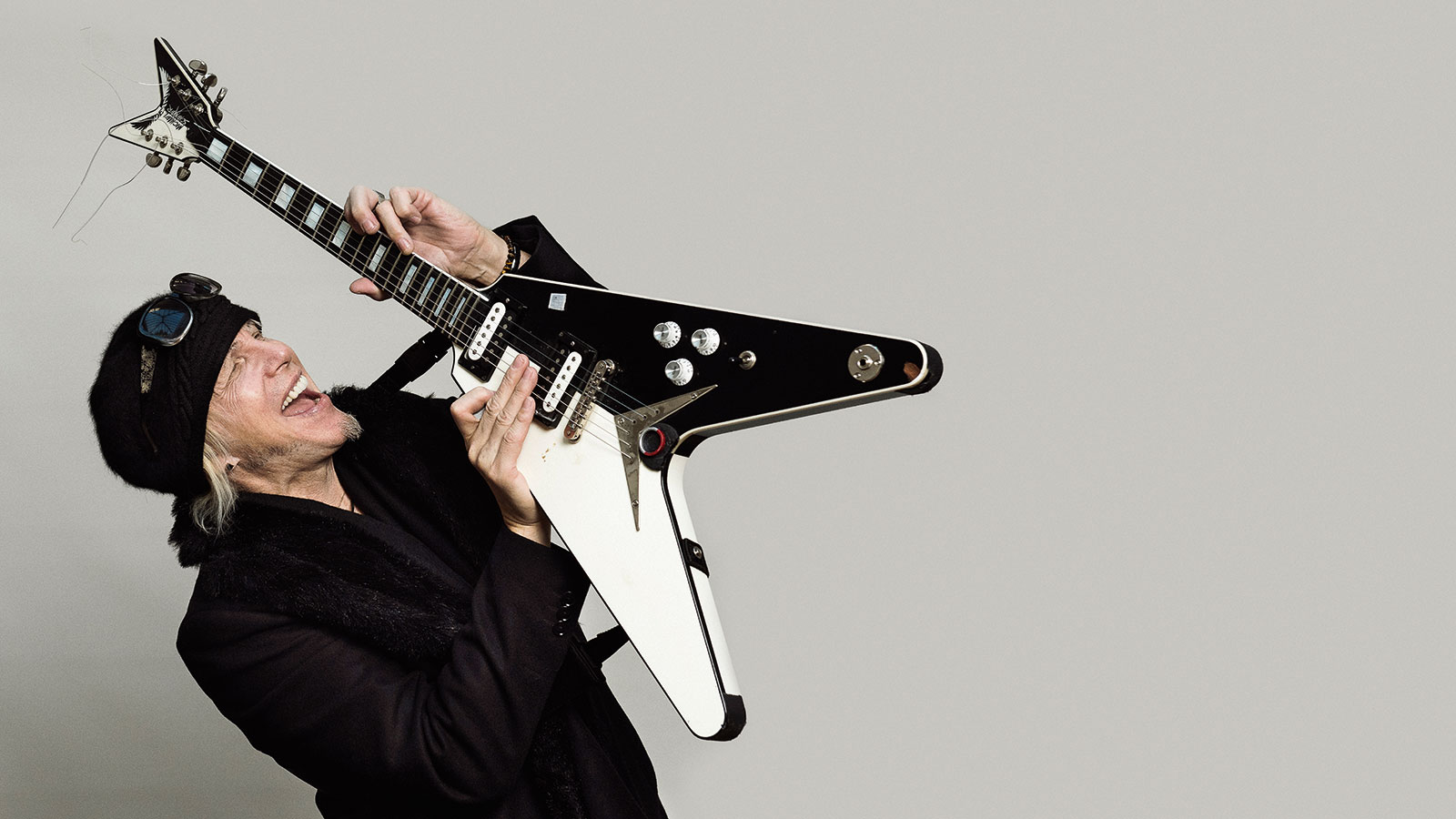Michael Schenker's 10 tips for guitarists: "The key is making each note carry a meaning"
One of the world’s most respected lead guitarists gives us his guide to six-string mastery...

Want all the hottest music and gear news, reviews, deals, features and more, direct to your inbox? Sign up here.
You are now subscribed
Your newsletter sign-up was successful
Michael Schenker is easily one of the more philosophical guitarists seen in these parts.
When you talk to the ‘blonde bomber’ who rose to fame in the late 1970s and early 80s playing on legendary recordings by Scorpions and UFO, he speaks with a profound sense of spiritualism - not so much in the religious sense, but rather with an introspective faith that reveals much about his creative path and the extraordinarily personal relationship he has with music.
Over the course of an afternoon, the guitarist describes much of his fretwork using analogies like hunting for goats, swimming in the Olympics and studying insects in order to build helicopters - all of which somehow makes perfect sense coming from his brilliantly bizarre, mad professor-like personality.
His genius is a rare one indeed - ask the guitarists in any rock/metal band from Metallica to Opeth who they’d consider to be the European equivalent to Eddie Van Halen and the answer will be virtually unanimous.
From a young age, Schenker’s choice notes, silky-smooth bends and piercing tone rapidly elevated him into the highest echelons of guitar godliness. So with a new retrospective collection, A Decade Of The Mad Axeman, and the debut from the Michael Schenker Fest band, Resurrection, out now, we look for tips from one of the all-time greats...
1. Running free
Playing guitar is all about making your fingers catch up with your brain...
Instead of recycling something that’s already out there, try to catch yourself. You can’t escape yourself!
“Some guitar players might feel they can’t catch up with me, but maybe they can catch themselves! That’s all I’m doing when I play - I’m catching myself. So, instead of recycling something that’s already out there, like my solos, try to catch yourself. Because, when you think about it, you can’t escape yourself!
Want all the hottest music and gear news, reviews, deals, features and more, direct to your inbox? Sign up here.
“Sometimes, we get so busy with all the external stuff, we forget about what’s inside. It’s all in there, somewhere. The art of lead guitar is really about pure self-expression and, at least for me, it’s about expanding into places you haven’t been to before.”
2. Feeling good
Schenker explains where he got that magical vibrato from...
“My early heroes were all the late-'60s guitarists; they were all very blues-orientated and with lots of feel. Guys like Jimmy Page, Jeff Beck, Johnny Winter, Rory Gallagher, Eric Clapton... and if you asked any of them who their influences were, they would all name the original black blues players.
“Look at Paul Kossoff’s vibrato: it’s not really my taste but it was definitely his style. Kirk Hammett has a vibrato a lot like mine on [1972 Scorpions debut] Lonesome Crow, but I’m not sure if he’s doing it on purpose. This one time he jammed with us, when I heard him play, it sounded a lot like my vibrato on that album. It could just be that he was attracted to it and kept it in his head. It could be a coincidence or somehow my playing on that album left an impression on him. I don’t know! When I listen back to that album, it just sounds like the beginning of my development.”

3. Who do we think we are
For Schenker, it’s what’s inside that counts...
“When I was about 17, I stopped listening to other music and other guitar players because I understood there was something in me that was unique and not known in this world, just as with any individual.
You have to look at it and say, ‘This is art, this is expression!’ You don’t measure it - it’s not bad, it’s not good - it’s just expression
“If I express myself, something new materialises - it’s like a new colour. If you keep doing that over and over again, you are showing people your true colours. You can do what I do, if you want, but it’s much better and more interesting to do things the way you see it. The problem is a lot of players don’t have the confidence; they think what’s inside of them is worse. But that’s a misconception - every single person has something unique inside of them, somewhere in there.
“The reason why some musicians don’t follow that is because they simply don’t have the confidence to believe that what they have in their heads is worth anything. You have to look at it and say, ‘This is art, this is expression!’ You don’t measure it - it’s not bad, it’s not good - it’s just expression. When you think like that, playing as pure as possible, at some point people will turn around and say, ‘Wow, this sounds truly unique...’”
4. Walk on water
Fluidity is everything...
“Sounding fluid is definitely the key to my approach. I love how Jeff Beck plays because he leaves the gaps - it’s incredible: he knows exactly when to play and when not to play. I love those gaps, but I don’t feel like they are my true calling. I’m more into building fluid passages, with less spaces but still managing to say something with each note. I have no time for filler notes - I throw them out because they just don’t fit into my personality.
“The key is making each note carry a meaning. I might use a passing note that’s wrong but because it introduces the next note, which is a right note, it works. If you don’t follow it up, then of course it will sound bad. You can make a mistake and always fix it if you are quick enough.
“Of course, I may accidentally come out with things while building it all up. Rock Bottom is a song I would improvise. Some days it would be good, other days not as good. A lot of times I wasn’t even aware of what I played until I hear it back, I might have thought it was rubbish and then find out it was good!”

5. Scales of justice
The less regimented your playing, the better...
“I don’t really have scales in my head. I don’t understand terms like Aeolian, or whatever. People always used to say to me, ‘Did you study classical music, or this symphony, or this or that?’ But no. That classical style is one particular way of playing, just like Spanish guitar has its own tendencies - going from E major to the F major and back - so that’s when more flamenco-style note choices may work well in different combinations.
I never wanted to be famous, I just wanted to enjoy playing and to always find a combination of different sprinklings
“It’s not that I know all these different scales off by heart; they’re all inside me and I just pick what works best in the moment. A person who practices scales, they don’t need to hear themselves, they can play without needing to. When I play, I need to hear myself because I don’t know what the next note needs to be. I have to hear the previous note in order to figure out the next one.”
6. Stuck in a rut
Even lead masters like Schenker have been prone to the same creative frustrations...
“There were times when I’ve felt stuck in one particular position, it took me a while before I could play things in different areas of the neck. That’s how you force yourself to play differently. Using different strings and patterns will give your ideas a different effect. It’s like copying how an insect flies and making a helicopter using the same concept.
“Everything is there somewhere inside you; you just have to find it. If you find yourself stuck, there are some important questions to focus on - who are you? How will you focus? What is your agenda? What do you expect and hope to achieve? All of those things make a difference in how you express yourself. I never wanted to be famous, I just wanted to enjoy playing and to always find a combination of different sprinklings.”

7. State of play
Work hard but always play harder...
“Force yourself to play on the spot and discover yourself. I don’t stick with one technique or scale because I want to move on and develop to discover new things. If you just go up and down one scale practising, there’s no real point to it other than keeping your fingers conditioned to move. You won’t really develop anything beyond that. So I call it ‘play’ - and play is a recreational place where you don’t score, you just enjoy.

“That’s how you reach new places, by enjoying what you play. It’s a bit like going goat-hunting: you have to enjoy walking around to find the goats nearby - and actually you enjoy the hunt more when you know you are going to find something. ‘Play’ is just like that! That’s what progresses you... every time I make a new album, there are new discoveries that will be sprinkled all over it and I keep moving forward like that.
“Sometimes, you might accidentally over-bend and come up with something that fits perfectly that I never would have thought of. For me, it’s a waste of time just to go through exercises. I like going straight into play and do moves in directions I’ve never gone in before.”
8. Perfect imperfection
It’s the little nuances that give your guitar playing personality...
“I like the suspense of things when they aren’t 100 per cent right. I like hearing things that surprise me, so in order to achieve that, I try to play in and out of the key and also with the timing. That’s why it creates this mysterious sound.
“Whenever I’m getting ready for a tour when there’s a new album out, I learn all the basics of the lead playing so I can stick with some of it. People expect to hear some songs the way the way they were recorded... you wouldn’t start the solo in Stairway To Heaven any different to how it is. People would be wondering, ‘What happened to that great thing I really wanted to hear?!’ And it’s a fine line: what to keep, what is necessary. You might want to keep the beginning or the really catchy parts that people latch onto.
“Learning my own stuff is so hard because it’s in the moment; the rhythm goes out and in by milli-milli-milli- seconds. How are you going to know how you felt in that moment when it’s all done completely free? In many ways, there really is no reference point when you are recreating things that were done in the moment - everything should always feel different to the last time you played it.”

9. Touch too much
Fast runs are all well and good, provided they actually arrive somewhere...
“Overly complicated playing is exactly what I stay away from. You do not want to get one single technique into your head, because once that groove is there, you will find it hard to get out of it.
“I thought Yngwie Malmsteen was sensational. Even though I wasn’t really listening to other music, some things you can’t ignore - they pop up everywhere. Somebody told me he was really into Reasons Love by UFO, where I play a really fast solo, and he took it a step further himself in a classical way.
I can almost imagine BB King saying, ‘Is this the note you are looking for, Mr Malmsteen?’
“The thing with fast playing is that it becomes very repetitive very quickly, especially if you stick to one style, like classical. When things go that fast, you can’t really feel or sit with the notes because it’s always running.
“I can almost imagine BB King saying, ‘Is this the note you are looking for, Mr Malmsteen?’ Because it’s like continually searching. That said, Yngwie was fantastic and so was Eddie Van Halen. Like Yngwie, he was everywhere - you couldn’t escape him.
“I was fascinated by that first album because I didn’t know how he was doing everything so rhythmically perfectly with a great sense of melody and taste. Unfortunately, then came all the schools in LA where, suddenly, people became stars because they took a shortcut and learned his tapping technique. But all these people learning his style in a crash course, in their thousands, didn’t have that taste or bother learning the things that can’t be taught overnight. Poor Eddie became overexposed and destroyed!
“That’s why it had to disappear; people didn’t know who was who. When you hear things everywhere and everywhere, you don’t want to hear them anymore... so then came the '90s and it all changed!”
10. Pace of mind
There’s only one way to make sure you’re on the money, says Schenker...
“I’ve done a lot of metronome practice; it’s a reference point to make sure you are not slowing down. The mind is a funny thing - without that reference point, you might think you’re playing at a certain speed and actually you’re not. The mind can trick you! When it comes to faster playing, you need to make sure you are ready. A metronome will help you find out if you are near where you should be.
“As you get older, you naturally slow down without noticing it! So if you don’t want to slow down, you need to set that reference point and make sure you stay there. It’s like an Olympic swimmer who sets a record: they won’t get any faster but they might want to want to at least stay there and the only way to do that is to time it. It’s like keep fit for guitarists!”
A Decade Of The Mad Axeman is out now on Inakustik; Ressurection is out now on Nuclear Blast.
Amit has been writing for titles like Total Guitar, MusicRadar and Guitar World for over a decade and counts Richie Kotzen, Guthrie Govan and Jeff Beck among his primary influences. He's interviewed everyone from Ozzy Osbourne and Lemmy to Slash and Jimmy Page, and once even traded solos with a member of Slayer on a track released internationally. As a session guitarist, he's played alongside members of Judas Priest and Uriah Heep in London ensemble Metalworks, as well as handling lead guitars for legends like Glen Matlock (Sex Pistols, The Faces) and Stu Hamm (Steve Vai, Joe Satriani, G3).


